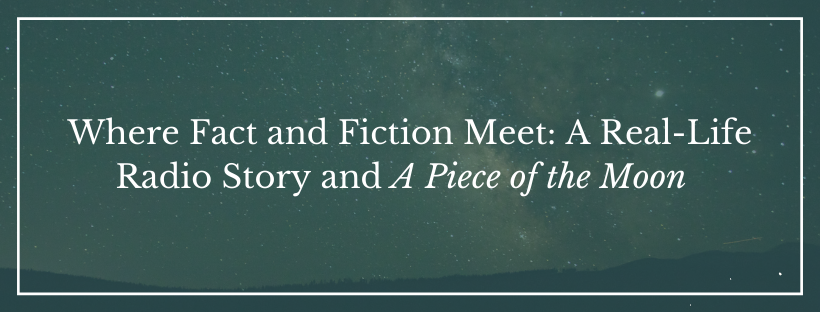
In the new Southern fiction novel A Piece of the Moon by Chris Fabry, much of the story focuses upon characters who work at Country 16, a small town radio station in West Virginia. Chris Fabry shared one of his personal stories from his time in radio and how it relates to his new novel. Read on below to learn about it.
When I was a teenager working at a radio station in West Virginia, I was called to service one weekend by Dick, the man who hosted the morning show. “Fabry, get down here, I need you.”
When I got there, I learned the Mud River had overflowed its banks and the local town was in danger. Dick left me in charge of the station and went to his house or to help others.
Since I was pressed into duty, I decided to have fun with the playlist. Instead of following the strict schedule of current hits, recurrent, solid gold and oldies, I decided to search for any song that had water or rain in it. Seemed like a good idea at the time. Eddie Rabbitt sang, “I Love a Rainy Night.” Willie Nelson sang about “Blue Eyes Crying in the Rain.” Ronnie Milsap had a hit titled “Smoky Mountain Rain.” I put on Elvis singing about “Kentucky Rain.” I may have even played Johnny Cash’s “Five Feet High and Rising.”
The creativity flowed and I was having a lot of fun behind the microphone. Then the request line rang. It was a listener from one of the areas where the Mud River had risen to such a height that it was up to the driveway in front of her house. I don’t recall her words now as much as I recall the frantic nature of her voice. She did not appreciate my creativity with the music at all. I hung up and continued my rain-soaked playlist.
The morning host returned, wet as an otter, and sat in the chair at the back of the room.
“Did you get to listen?” I said, hopeful for some words of affirmation.
“Yeah,” he muttered. “I heard you making fun of people who are about to lose everything. Do you know what it’s like to have to leave your house in a rowboat?”
I stared at him. I lived away from the river on a knoll, never thinking once about those whose homes were in the vicinity of that brown, snakelike tributary.
“I know you didn’t mean anything bad by it. But you have to think like a listener. They don’t need you playing songs about water and yukking it up.”
It was a hard conversation, but it changed me. Until then, I didn’t understand the power of words and songs and the companionship radio presents. And that experience connected me with those on the other side of the radio like nothing else. So when I crafted the story A Piece of the Moon, I put a young man, Clay, in that same situation I was in and ramped up the conflict. He has a stutter and never goes on the air live. But the flood is getting worse and if he doesn’t speak, there will be great destruction and possibly loss of life. Will he protect himself and stay silent, or will he do the scariest thing in the world because he cares more about the listener than his reputation? That’s the kind of conflict that will pull you through a story almost as much as trying to find hidden riches.
My experience on the radio the day of the flood is a mirror of what Clay learns in A Piece of the Moon. Words and music hold a lot of power. They can close your heart to the possibility of love and life or open it up to receive something you never dreamed possible.
I hope A Piece of the Moon will sing in your soul.


